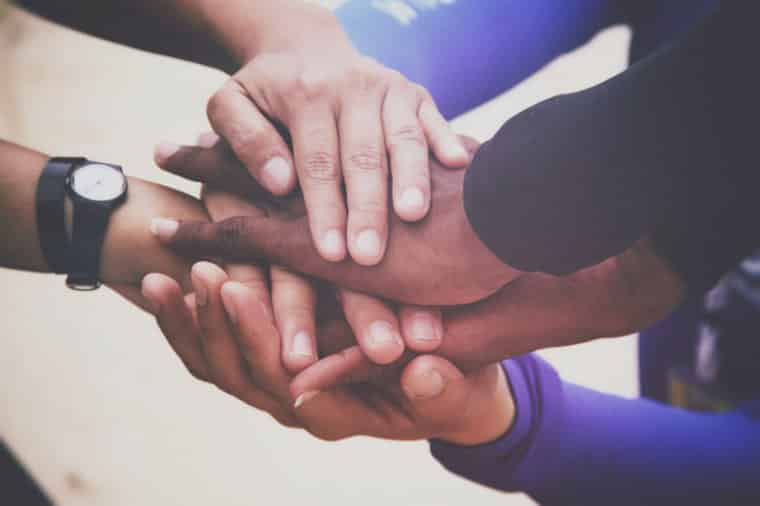As Kirsten Nottleson faced the room of 30 female prison inmates, she could barely think.
“We'd been told that these women were coming to the end of their sentences, that they would soon be reunified, and we'd prepared some pretty emotional stuff,” she says.
But as she and her co-worker walked through the prison that chilly December Saturday they were given a different story by the warden. Some of the women they'd be meeting were on life sentences, and would never live with their children again. And December, a particularly poignant month for inmates missing their families, had the highest suicide rates of the year.
“I was just standing there thinking, what's going to happen?” she says.
Kirsten is an instructor with the non-profit organisation Hand in Hand Parenting. She'd gone into the facility to implement a curriculum based on connection parenting tools. In front of her, 30 assembled inmates from different prisons had been chosen to be trained as peer educators, a job that meant they would pass on what they learned in the workshops to hundreds of sentence-serving women.
Some were such high-profile subjects that Kirsten recognised them from newspaper headlines. But she got to know them deeper than any journalist could.
At the beginning of that first session, she took a deep breath and introduced a tool called Listening Time, using her nerve-wracking position as workshop leader as a catalyst.
With a partner-trainer she spoke about her feelings. “I cried, I shook a little, I said I had big feelings about talking and sharing for the next 48 hours. I think that broke the ice. They all seemed to say, “Oh! That's how this works.””
 When they arrived back to class the next morning the several women told Kirsten they'd started using the Listening Time tool with each other, on the bus that night, driving away from their session.
When they arrived back to class the next morning the several women told Kirsten they'd started using the Listening Time tool with each other, on the bus that night, driving away from their session.
Several had already shared it with inmates in their own facilities, and found a similarly positive reaction.
Listening time simply opens space for parents to tell their stories. Pairs or small groups have a set amount of time where one person talks, and everyone else listens. Advice is not offered, but empathy is. This process of feeling heard can be deeply connecting, says Kirsten, and is why it was so openly received.
The need for connection is so strong.
“They are scared to death. They have tons in their emotional backpacks that they come with, not only about their crimes and what happened to their families when they came to prison, but what they grew up with that lead them to do the crimes in the first place,” says Kirsten.
“They carry all that around. And then you give them this tool, that they can do with each other, where there is no judgment, no blaming. It's a perfect tool for that population.”
Together, as Kirsten introduced more tools, this time intended for use with children, the group explored their painful histories.
Asking for Attention
In one powerful game, Kirsten had an inmate act like a child asking for love. She stood in the centre of a group circle holding a soft toy, and was asked how she'd get their attention. Those in the outer group were instructed to turn away as she begged to play. In time, she screamed and yelled, cried, hit and pulled at them in a bid to be noticed.
Lightening bolts went off around the room as they recalled childhoods where they had been ignored, abandoned, and abused.
“I just thought I was a rotten kid,” Kirsten recalls one saying.
They saw how the cycle continues in their own families.
“They'd ask, “Is that what it feels like for for my child, is that how it feels for them with me in prison?””
Next they reversed the game, using the same inmate in the circle, but this time welcoming her with warmth. The energy in the room changed to positivity and real hope for change.
That warmth spread, Kirsten noticed. She had been instructed that inmates were not allowed to touch anyone. She was not allowed to touch them. Guards prohibit any hugging or display of affection. But by the time her workshops were winding up, those guards were openly hugging their wards.
Hand in Hand's tools break cycles of poverty, abuse, violence and hate, says Kirsten, and they work universally. Each of the five tools is based on listening and connecting, and each addresses the guilt, confusion, isolation and exhaustion that every parent faces.
Universal Tools for Universal Worries
Parents worry that their children aren't doing enough homework, or that they are watching too much TV. “Being incarcerated doesn't change that,” says Kirsten.
“What was so positive was that they really wanted to share this with younger women, particularly mothers that would be united with their children. They're feeling was, “Listen, we have made big mistakes in our lives and it has decimated our lives and our family's lives and we want to do what we can to make sure that other women don't make those same mistakes.””
She sees the same profound transformations in her work at drug treatment centres in Austin, Texas, where she resides and where she teaches the tools in ongoing parenting classes.
Most of the parents are new to rehab.
“Sometimes I wonder how much they can absorb when they have so much going on. They are so fresh into their recovery. They are juggling so much – Child Protective Services cases, treatment centre, trying to get a job, trying to pay rent, it's a lot. Then I get these emails that say, ‘It's been four years and I'm still doing these tools with my kid,'” says Kirsten.
One of these woman was new to recovery and regularly arrived at classes, but could barely touch the baby she brought with her.
“She'd have her baby way out at the end of her lap, as far as she could without dropping him,” recalls Kirsten. “She was so disconnected. She was so despondent, downtrodden, her eyes cast down. She was clearly having a really hard time.”
One day Kirsten arrived to a roomful of stressed parents, the woman's baby was screaming and the mom desperate and upset. Everyone had tried to calm him, but failed, and he was thrust into Kirsten's arms. “Do that listening thing you told us about, he's been crying all day.”
That ‘listening thing' is another tool, called Staylistening, that supports a child as he offsets fear and trauma through tears.
“I just held him. And I looked at him. I checked with her and said, “Is this ok?” and she said, “Yes.” Kirsten held the baby, telling him, “I'm here, I'm listening”, without trying to jiggle or shush him, holding him until he settled.
 She passed the now calm baby back to his mom, and she held him close for the first time.
She passed the now calm baby back to his mom, and she held him close for the first time.
The next week, when she returned to class, she had him nestled on her chest.
“Her whole disposition had changed, just by showing her that you don't have to change his feelings,” Kirsten says.
Six years later, they met again. She'd relapsed, but she told Kirsten. “Me and my son, we've always been, ‘like this,'” she said, and held up two intertwined fingers.
Later, Kirsten heard about the woman again through another recovering addict, who told her: “Oh! She is my rock. She is the one that all the other moms call if they are having a hard time.”
“She's like the the mama-rock, the one that helps and supports them all,” says Kirsten.
Connection starts simply, when one person just shares that they like another person, that they can be heard without judgment and supported with warmth, she says. “There's an indomitable human spirit that wants to heal, and to do better.”
Hand in Hand, and what Kirsten sees in her classes, speaks of the “unbelievable power of human connection and what it can do.”
It's a power that can shape the next generation.
Hand in Hand Parenting is a non-profit organisation founded by Patty Wipfler. Donations help Hand in Hand fund programs, like Kirsten's, in vulnerable communities in the US and across the world.
Give Today and Support Parents When Parenting Gets Hard
Build trust and support with your child, and give them the security of feeling your love and caring every time you do Special Time. Give to our Special Time Fundraiser today and receive your toolkit.
Save
Save
Save
Save
Save
Save

